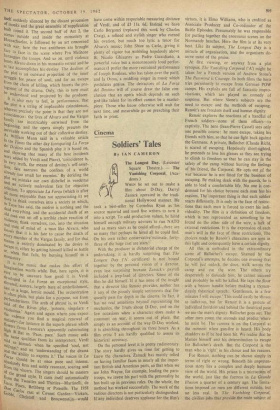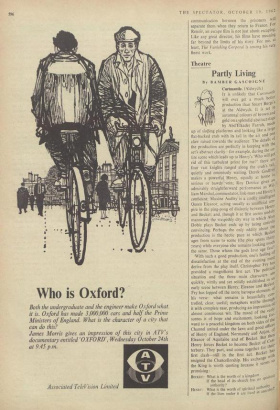Cinema
Soldiers' Tales
By IAN CAMERON WHEN he set out to make a film about D-Day, Darryl Zanuck operated in the tradi- tional Hollywood manner. He took a best-seller by Cornelius Ryan as his source material and used five writers to turn it into a script. To add production values, he hired himself enough military advisers to run NATO and as many stars as he could afford—there are so many that perhaps he hired all he could find. On his own rather conservative -estimate, forty- three of the huge cast are Stars,' With the producer in dictatorial charge of the undertaking, it is hardly surprising that The Longest Day CA' certificate) is not bound together by the personal vision of a director, even less surprising because Zanuck's payroll included a jeep-load of directors. Some of the film he did himself. If it has none of the insight that a director like Renoir provides, neither has it any of the piously simple sentiments that fre- quently pass for depth in the cinema. In fact, it has no real ambitions beyond representing the mechanics, the Truth about D-Day, and on the few occasions when a character does make a comment on war, it seems out of place. But simply as an account of the way D-Day worked, it is absorbing throughout its three hours. As a film critic 1 am hardly qualified to assess its historical accuracy. On the personal level it is pretty rudimentary. The story hardly gives us time for getting to know the characters. Zanuck has mainly relied on having familiar faces in nearly all the impor- tant British and American parts, so that when we see John Wayne, for example, leading the para- troops, we invest his part with the personality he has built up in previous roles. On the whole, the method has worked successfully. The work of the various directors is not particularly distinguished. If any individual deserves applause for the film's
virtues, it is Elmo Williams, who is credited as
o- Associate Producer and Co-ordinator of the Battle Episodes. Presumably he was responsible for putting together the enormous scenes on the Normandy beaches. Here the film is at its very best. Like its subject, The Longest Day is a miracle of organisation, and-the organisers de- serve most of the praise. At first viewing, or anyway from a plot synopsis, The Vanishing Corporal CA') might be taken for a French version of Andrew Stone's both films th The Password is Courage. In bote hero from tries persistently to escape fro German POW
are impro-
visations, full o camps. His exploits af fantastic imo- visations, which are played as comedy of suspense. But where Stone's subjects are the need to escape and the methods of escaping, Renoir's are freedom itself and human dignity. Renoir explores the reactions of a handful of French soldiers—none of them officers—to captivity. The hero (Jean-Pierre Cassel) sees only one possible course: he must escape, taking his friends with him, so that he can fight back against the Germans. A private, Ballochet (Claude Rich), is scared of escaping. Hopelessly short-sighted, he pretends to lose his glasses as they are trying to climb to freedom so that he can stay in the safety of the camp without hurting the feelings of his friend, the Corporal. He opts out of the war because he is not fitted for the business of escaping. By making deals with the guards, he is able to lead a comfortable life. No one is con- demned for his choice because each man has his reasons. The important thing is that each soldier reacts differently. It is only in the face of restric- tions that each man is forced to exert his indi- viduality. The film is a definition of freedom, which is not represented as something to be found on the other side of the wire, a ladk of external restrictions. It is the expression of each man's will in the face of these restrictions, The choices made by Renoir's characters are seen in this light and consequently have a certain dignity. All this is embodied in the extraordinary scene of Ballochet's escape. Shamed by the Corporal's attempts, he decides one evening that he will just unlock, the door, walk across the camp and cut the wire, The others try desperately to dissuade him; he cannot succeed and probably he will be killed. He taps the,floor with a broom handle before making a tremen- dously theatrical speech: 'Gentlemen, in a few minutes I will escape.' This could easily be shown as ludicrous, but for Renoir it is a gesture of individual freedoin arid behind the theatrical pose we see the man's dignity. Ballochet goes out. The other men count the seconds and predict' where he must be. The camera is on the Corporal at the moment when gun-fire is heard. His body shudders as if he had been hit. We realise that he blames himself and his determination to escape fcir Ballochet's death. But the Corporal is the man who is 'right' in his choice and his reasons. For Renoir, nothing can be shown simply in terms of right or wrong. Beneath his unpreten- tious story lies a complex and deeply humane view of the world. His prison is a microcosm of the world, just like the fortress in La Grande Illusion a quarter of a century ago. The limita- tions imposed on men are different outside, but no less real. In The Vanishing Corporal, the civilian jobs that provide the main subject of communication between the prisoners separate them when they return to France. For Renoir, an escape film is not just about escaping. Like any great director, his films have meaning far beyond the limits of his story. For me, at least, The Vanishing Corporal is among his very finest work.















































 Previous page
Previous page